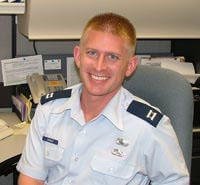Trevor Sthultz had an easy transition out of the military, finding a good job right after he left the Air Force and buying a home in Columbus, Ohio. He had little to no problems during his move from the military to the civilian world.
Sthultz's transition was easy because he ensured that everything was in place before he got out. He looked for employment and researched where he wanted to live long before his transition date, compared his military benefits to the corporate world's employee benefits plans and purchased a new civilian wardrobe. And thanks to his foresight, the only thing he had to worry about on his first day of work was what to wear.
In the following interview, Sthultz describes his transition and how service members can make their transition a little easier.
Military.com: How long did you serve, and which branch of the armed forces did you join?
Trevor Sthultz: "I was active duty in the United States Air Force for 8½ years. My last day on active duty was Jan. 20, 2008. I am in the reserves now."

MC: What was your highest rank, and where were you stationed?
TS: "My highest rank was captain. I was stationed at McGuire Air Force Base in New Jersey for three years and at Wright-Patterson AFB in Dayton, Ohio, for 5½ years. I'll soon compete for the rank of major in the reserves."
MC: Did you earn your degree while you were in the service?
TS: "I earned my undergraduate degree in business while on a ROTC scholarship. I later attended the Air Force Institute of Technology (AFIT) while on active duty and earned a master of science in strategic purchasing."
MC: Did you have a solid transition plan?
TS: "I wouldn't say that I had a concrete plan, but I knew I wanted to go into the corporate environment and I knew that I wanted to stay in Columbus, Ohio. I bought a house here and looked forward to building a career here, so I knew where I wanted to go. I looked around the market for jobs, but quickly narrowed my search down to AEP [American Electric Power]. AEP was at the top of my list for places to work. I was gunning very hard for a job there."
MC: How did you learn of AEP?
TS: "Having lived in Columbus, I knew about AEP -- AEP provides power to the Columbus area -- and I was an AEP customer. And when looking around at different corporations in the area, AEP stood out as an employer that is a strong supporter for their military members.
"I knew this was a company that I had to be a part of. I checked their website, saw some job postings, went through their review process and ended up being hired directly into the Commercial Operations Business Process Improvement group."
MC: How did you translate your military experience into skills they would understand?
TS: "Well, I explained what I did as far as what my job was in the military. The first few years were in aircraft maintenance, which gave me good organizational and leadership skills. The last five years of my military career were in acquisitions, and I served in various roles. Additionally, I was very fortunate to serve as an aide-de-camp to the general in command of the Air Force Materiel Command. That was quite an experience.
"I explained in my interviews that I bring a business background from my experience in acquisitions, military experience, leadership and people skills, the ability to create and administer project plans, carry out multiple tasks, understand and execute timelines, and be flexible in changing environments.”
MC: Did you take to the civilian world immediately?
TS: "I wouldn't say that I took to it immediately. There were certain things that I had to stop doing, such as calling my managers sir or ma'am all the time. But there are small things you don't think about, such as the different jargon. You have to learn a new language in the utility-specific industry.
"And I had to go clothes shopping. I found that I didn't have that much business attire. In the military, I always knew what I was going to wear the next day. I started in the winter and I bought a lot of business winter clothing, and then when summer came, I realized that I needed to buy summer clothes for the office."
MC: Did you take any TAP classes?
TS: "I did take some preliminary classes, but those were required; they had checklists and regimented processes. Those classes bring certain aspects of transition to the forefront of your mind that you may forget or have not thought about, and for me, it was a little easier because I'm not married and I don't have dependents, so it's an entirely different equation for me. So it was perhaps an easier process for me. I was lucky in that respect."
MC: Did you encounter any hiccups during the transition process?
TS: "I really haven't encountered any hiccups so far. I still consider myself as being in the transitioning process. I've only been here for a short while -- eight months. I would say it might take at least a year to get completely acclimated to the [civilian] environment."
MC: What advice would you give to service members who are transitioning?
TS: "It's not an easy decision to leave the service; you get used to the camaraderie. I would [advise] that they take stock of all of their benefits and what they'll be compensated for in the civilian world. If they don't do that before transitioning, they'll find that they may have to take a pay cut and make a heavy life adjustment as a result. Do your due diligence.
"I would [also add these] three things.
- Before you make the transition, talk with your family to make sure that you're moving in a smart direction.
- And then once the decision has been made, you should create a binder of all of your military information -- training, OPR [Officer Performance Report]/EPR [Enlisted Performance Report], medical documentation, awards, etc. -- to help you display your skill sets and background to the corporate world when you interview.
- Start sooner rather than later. It can take awhile. If you impose limitations such as location, then you limit your options. So if you know you want to move somewhere, start looking at least 6-8 months in advance. And get the word out there -- network, network, network."
MC: How can transitioning service members find jobs at AEP?
TS: "Go to AEP.com to apply and review their military policies and benefits. If service members apply, they should look through the various jobs and match up the skills they feel apply to them."
MC: Do you enjoy working at AEP?
TS: "AEP is like a family. They take care of their employees, and that's why I made it a personal goal to work for AEP. I am very happy to be a part of the AEP family."
Find the Right Veteran Job
Whether you want to polish your resume, find veteran job fairs in your area or connect with employers looking to hire veterans, Military.com can help. Sign up for a free Military.com membership to have job postings, guides and advice, and more delivered directly to your inbox.











